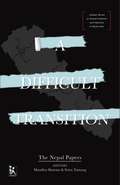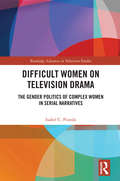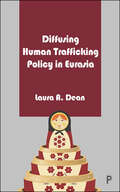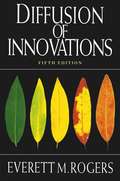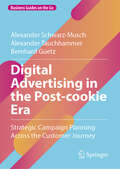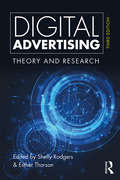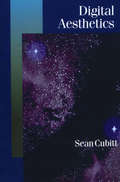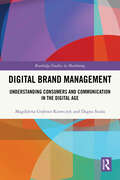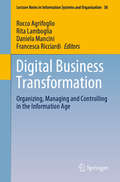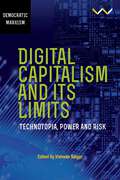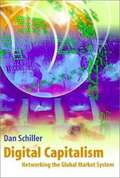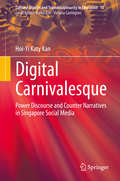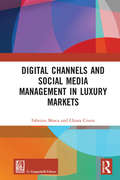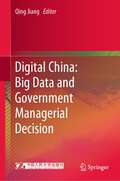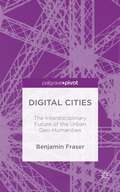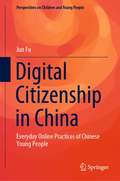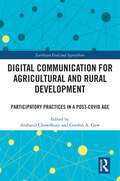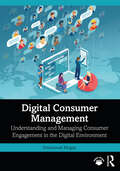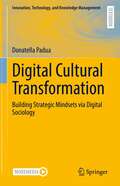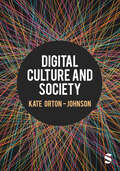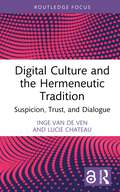- Table View
- List View
Difficult Students and Disruptive Behavior in the Classroom: Teacher Responses That Work
by Daniel Sciarra Vance AustinAttachment-based strategies for reaching and teaching disruptive, difficult, and emotionally challenged students. Difficult Students and Disruptive Behavior in the Classroom provides skills-based interventions for educators to address the most common problem behaviors encountered in the classroom. Offering not just problem-specific “best practices” but an attachment-based foundation of sound pedagogical principles and strategies for reaching and teaching disruptive, difficult, and emotionally challenged students, it empowers educators to act wisely when problem behaviors occur, improve their relationships with students, and teach with greater success and confidence.
Difficult Transition, A: The Nepal Papers
by Mandira Sharma Seira TamangThe Sexual Violence and Impunity in South Asia research project (coordinated by Zubaan and supported by the International Development Research Centre) brings together, for the first time in the region, a vast body of research on this important - yet silenced - subject. Six country volumes (one each on Bangladesh, Nepal, Pakistan, Sri Lanka, and two on India, as well as two standalone volumes) comprising over fifty research papers and two book-length studies, detail the histories of sexual violence and look at the systemic, institutional, societal, individual and community structures that work together to perpetuate impunity for perpetrators. The essays in this volume focus on Nepal, which though not directly colonized, has not remained immune from the influence of colonialism in its neighbourhood. In addition to home-grown feudal patriarchal structures, the writers in this volume clearly demonstrate that it is the larger colonial and post-colonial context of the subcontinent that has enabled the structuring of inequalities and power relations in ways that today allow for widespread sexual violence and impunity in the country - through legal systems, medical regimes and social institutions.The period after the 1990 democratic movement, the subsequent political transformation in the aftermath of the Maoist insurgency and the writing of the new constitution, has seen an increase in public discussion about sexual violence. The State has brought in a slew of legislation and action plans to address this problem. And yet, impunity for perpetrators remains intact and justice elusive. What are the structures that enable such impunity? What can be done to radically transform these? How must States understand the search for justice for victims and survivors of sexual violence? The essays in this volume attempt to trace a history of sexual violence in Nepal, look at the responses of women's groups and society at large, and suggest how this serious and wide-ranging problem may be addressed
Difficult Women on Television Drama: The Gender Politics Of Complex Women In Serial Narratives (Routledge Advances in Television Studies)
by Isabel C. PinedoDifficult Women on Television Drama analyses select case studies from international TV dramas to examine the unresolved feminist issues they raise or address: equal labor force participation, the demand for sexual pleasure and freedom, opposition to sexual and domestic violence, and the need for intersectional approaches. Drawing on examples from The Killing, Orange is the New Black, Big Little Lies, Wentworth, Outlander, Westworld, Being Mary Jane, Queen Sugar, Vida, and other television dramas with a focus on complex female characters, this book illustrates how female creative control in key production roles (direct authorship) together with industrial imperatives and a conducive cultural context (indirect authorship) are necessary to produce feminist texts. Placed within the larger context of a rise in feminist activism and political participation by women; the growing embrace of a feminist identity; and the ascendance of post-feminism, this book reconsiders the unfinished nature of feminist struggle(s) and suggests the need for a broader sweep of economic change. This book is a must-read for scholars of media and communication studies; television and film studies; cultural studies; American studies; sociology of gender and sexualities; women and gender studies; and international film, media and cinema studies.
Diffusing Human Trafficking Policy in Eurasia
by Laura DeanOffering a perceptive study of the urgent human rights issue of trafficking in persons, this important book analyses the development and effectiveness of public policies across Eurasia. Drawing on multi-method research in the region, Laura A. Dean explores the factors behind anti-trafficking strategies and the role of governments and activists in combating labour and sexual exploitation. She examines the intersection of global strategies and state-by-state approaches, and uses the diffusion of innovation framework to cast new light on the impetus and implementation of different policy typologies. Identifying the strengths, weaknesses, and best practices in human trafficking policies around Eurasia, Dean’s book will appeal to a wide range of students, scholars, practitioners, and policy makers.
Diffusion of Innovations, 5th Edition
by Everett M. RogersNow in its fifth edition, Diffusion of Innovations is a classic work on the spread of new ideas.In this renowned book, Everett M. Rogers, professor and chair of the Department of Communication & Journalism at the University of New Mexico, explains how new ideas spread via communication channels over time. Such innovations are initially perceived as uncertain and even risky. To overcome this uncertainty, most people seek out others like themselves who have already adopted the new idea. Thus the diffusion process consists of a few individuals who first adopt an innovation, then spread the word among their circle of acquaintances--a process which typically takes months or years. But there are exceptions: use of the Internet in the 1990s, for example, may have spread more rapidly than any other innovation in the history of humankind. Furthermore, the Internet is changing the very nature of diffusion by decreasing the importance of physical distance between people. The fifth edition addresses the spread of the Internet, and how it has transformed the way human beings communicate and adopt new ideas.
Dig Your Heels In: Navigate Corporate BS and Build the Company You Deserve
by Joan KuhlJoan Kuhl helps women create a clear vision of what their career path deserves to be and make a convincing business case for equality to their managers and senior leadership. You'll learn strategies for overcoming sexist cultural attitudes about gender and leadership, as well as for dealing with self-limiting behaviors like Imposter's Syndrome (the feeling that you're never good enough despite a track record of success) and the Myth of Meritocracy (the idea that just doing good work is the only way to advance). Because relationships are absolutely crucial, Kuhl describes how to build support networks before you even need them and explains how to get actionable feedback that will help you get to the next level—the kind women rarely are afforded. Case studies, practical exercises, and inspiring stories from Kuhl's work with clients at companies such as Eli Lilly and Company, Goldman Sachs, U.S. Soccer, BlackRock, South Carolina Asphalt Pavement Association and top business schools make this a truly comprehensive guide. It's an indispensable resource for women seeking to build the confidence and conviction to secure the seat at the table they've earned and create a welcoming workplace for everyone.
Digital Activism in the Social Media Era
by Bruce MutsvairoThis book probes the vitality, potentiality and ability of new communication and technological changes to drive online-based civil action across Africa. In a continent booming with mobile innovation and a plethora of social networking sites, the Internet is considered a powerful platform used by pro-democracy activists to negotiate and sometimes push for reform-based political and social changes in Africa. The book discusses and theorizes digital activism within social and geo-political realms, analysing cases such as the #FeesMustFall and #BringBackOurGirls campaigns in South Africa and Nigeria respectively to question the extent to which they have changed the dynamics of digital activism in sub-Saharan Africa. Comparative case study reflections in eight African countries identify and critique digital concepts questioning what impact they have had on the civil society. Cases also explore the African LGBT community as a social movement while discussing opportunities and challenges faced by online activists fighting for LGBT equality. Finally, gender-based activists using digital tools to gain attention and facilitate social changes are also appraised.
Digital Advertising in the Post-cookie Era: Strategic Campaign Planning Across the Customer Journey (Business Guides on the Go)
by Alexander Schwarz-Musch Alexander Tauchhammer Bernhard GuetzThis book explains how companies can successfully plan and implement their online campaigns – even after the end of third-party cookies. Campaigns on social media platforms, in search engines, and through display advertising can still be effective if potential customers are targeted accurately. The authors demonstrate how this can work without cookies: developing a "Minimum Viable Persona" and defining campaign groups along the customer journey play central roles. For each touchpoint on the path to purchase, milestones must be tracked, allowing the effectiveness and efficiency of the measures to be easily verified. A resource for marketing professionals seeking solutions in the post-cookie era to continue reaching their target audiences without waste coverage.
Digital Advertising: Theory and Research (Advances in Consumer Psychology)
by Esther Thorson Shelly RodgersDigital Advertising offers a detailed and current overview of the field that draws on current research and practice by introducing key concepts, models, theories, evaluation practices, conflicts, and issues. With a balance of theory and practice, this book helps provide the tools to evaluate and understand the effects of digital advertising and promotions campaigns. New to this edition is discussion of big data analysis, privacy issues, and social media, as well as thought pieces by leading industry practitioners. This book is ideal for graduate and upper-level undergraduate students, as well as academics and practitioners.
Digital Aesthetics (Published in association with Theory, Culture & Society)
by Sean CubittThis book investigates the aesthetic nature and purpose of computer culture in the contemporary world. It casts a cool eye on the claims of cybertopians, tracing the globalization of the new medium and enquiring into its effects on subjectivity and sociality. Drawing on historical scholarship, philosophical aesthetics, and the literature of cyberculture, the author argues for a genuine democracy beyond the limitations of the free market and the global corporation. Digital arts are identified as having a vital part to play in this process. Written in a balanced and penetrating style, the book both conveniently summarizes a huge literature and sets a new agenda for research and theory. Copyright © Libri GmbH. All rights reserved.
Digital Brand Management: Understanding Consumers and Communication in the Digital Age (Routledge Studies in Marketing)
by Magdalena Grębosz-Krawczyk Dagna SiudaIn today’s fast-evolving digital landscape, branding has transcended traditional boundaries, becoming a dynamic and multifaceted process. This book provides an in-depth exploration of brand management in the digital world, covering its historical evolution, theoretical foundations, and strategic applications. It delves into brand positioning, consumer perception, and the role of digital media in shaping brand image. Furthermore, it highlights integrated communication strategies and the significance of virtual brand communities in fostering brand loyalty. The authors examine emerging trends in digital branding, such as AI-driven personalization, user experience and platformization, and algorithmic branding, emphasizing their impact on consumer engagement and brand differentiation. It also addresses the ethical challenges of digital brand management, including data privacy, transparency, and authenticity, underscoring the importance of responsible brand stewardship in a competitive and rapidly evolving digital environment.This book serves as a comprehensive guide for scholars and academics across marketing, brand management and consumer behaviour.
Digital Business Transformation: Organizing, Managing and Controlling in the Information Age (Lecture Notes in Information Systems and Organisation #38)
by Francesca Ricciardi Rocco Agrifoglio Daniela Mancini Rita LambogliaThe recent surge of interest in “digital transformation” is changing the business landscape and posing several challenges, both organizational and sectoral. This transformation involves the application of digital technology in all aspects of business, and enables organizations to create new products and services, and to find more efficient ways of doing business.Moreover, the digital transformation is happening within and across organizations of all types and in every industry, producing a disruptive innovation that can break down the barriers between people and organizations, and help create more adaptive processes. In the information age, it is imperative for organizations to develop IT-related capabilities that allow them to leverage the potential of digital technologies. Due to the pervasive effects of this transformation on processes, firms and industries, both scholars and practitioners are interested in better understanding the key mechanisms behind the emergence and evolution of the digital business transformation.This book presents a collection of research papers focusing on the relationships between technologies (e.g., digital platforms, AI, blockchain, etc.), processes (e.g., decision-making, co-creation, financial, compliance, etc.), and organizations (e.g., smart organizations, digital ecosystems, Industry 4.0, collaborative networked organizations, etc.), which have been categorized into three major areas: organizing, managing and controlling. It also provides critical insights into how the digital transformation is enhancing organizational processes and firms’ performance through an exploration and exploitation of internal resources, and through the establishment of external connections and linkages. The plurality of views offered makes this book particularly relevant for users, companies, scientists, and governments. The content of the book is based on a selection of the best papers (original double-blind peer-reviewed contributions) presented at the annual conference of the Italian chapter of the AIS, which was held in Naples, Italy in September 2019.
Digital Capitalism and its Limits: Technotopia, Power and Risk
by Vishwas SatgarThe Fourth Industrial Revolution (4IR) has been described as the next big leap in digital capitalism. Digital technologies such as artificial intelligence, quantum computing, 3D printing and robotisation, we are led to believe, will bring more progress, growth and development while also helping us to resolve the deep and multiple crises the world is in. Billions are being invested in these technologies, accompanied by sharp geopolitical rivalries to secure an edge in the control over them. Volume 8 in the Democratic Marxism series invites readers to think more deeply and critically about digital capitalism and its limits. While most governments in the world, including South Africa, have accepted a techno-nationalist narrative and have deliberated on the risks for the planet and humanity, the volume interrogates the effects and consequences of advances in artificial intelligence and heightened technological innovation and industrialisation on employment, democracy and the climate. Viewing the grand social engineering of 4IR through a Marxist lens, the volume contributors engage critically with the class project of digital monopoly capitalism and its powerful totalitarian tendencies. They question the dangerous technotopian imaginary shaping this digital techno-shift, the implications of algorithmic data extractivism, the securitisation of already weak market democracies, the social consequences of digital learning, lack of regulation, and the power dynamics in the labour process. Anchored in techno-realism, the interdisciplinary perspective captured in this volume puts forward alternatives for democratisation and a just transition to protect human and non-human life.
Digital Capitalism: Networking the Global Market System
by Dan SchillerCyberspace not only exemplifies but spearheads the greater political economy of which it has become such a critical part. The networks that comprise cyberspace were originally created at the behest of government agencies, military contractors, and allied educational institutions. However, over the past generation or so, a growing number of these networks began to serve primarily corporate users. Under the sway of an expansionary market logic, the Internet began a political-economic transition toward what Dan Schiller calls "digital capitalism." Schiller traces these metamorphoses through three critically important and interlinked realms. Parts I and II deal with the overwhelmingly "neoliberal" or market-driven policies that influence and govern the telecommunications system and their empowerment of transnational corporations while at the same time exacerbating exisiting social inequalities. Part III shows how cyberspace offers uniquely supple instruments with which to cultivate and deepen consumerism on a transnational scale, especially among privileged groups. Finally, Part IV shows how digital capitalism has already overtaken education, placing it at the mercy of a proprietary market logic.
Digital Carnivalesque: Power Discourse and Counter Narratives in Singapore Social Media (Cultural Studies and Transdisciplinarity in Education #10)
by Hoi-Yi Katy KanThis book challenges the framing of comedic acts as apolitical and it adopts a multimodal critical discourse approach to interrogate the performance of comedy as a form of power. It proposes using Bakhtin’s carnivalesque as the analytic tool to distil for readers key differences between humour as banal and humour as critical (and political) in today’s social media. Drawing from critical theory and cultural studies, this book takes an interdisciplinary approach in formulating a contemporary view of power that reflects social realities not only in the digital economy but also in a world that is increasingly authoritarian. With the proposition of newer theoretical lenses in this book, scholars and social scientists can then find a way to shift the conversation to uncover the evolving voices of (existing and newer) power holders in the shared digital space; and to view current social realities as a continual project in unpacking and understanding the adaptive ways of the human spirit.
Digital Channels and Social Media Management in Luxury Markets (Routledge-Giappichelli Studies in Business and Management)
by Fabrizio Mosca Chiara CiveraIn recent years, luxury goods markets have faced significant changes that have influenced both the dynamics of the competition, as well as their strategies. The principal changes include the following: new geographical market development, such as in the Far East, India, and some parts of Africa (these countries are added to a list of already relevant countries that are involved in luxury goods consumption, such as the Emirates, Russia, and South America); diffusion of new media and new technologies in communication, which is characterized by a high degree of interaction; the evolution of distribution channels is underway – these channels are moving towards new forms of integration that utilize both physical digital channels. This has forced firms to revise their strategies and implement multichannel marketing strategies to continue to operate in increasingly international markets that are characterized by increasingly more demanding and informed consumers. This book will enable readers to gain a clear insight into how the luxury goods market operates and amongst other things, focuses on: recent internet and social media strategies adopted by luxury companies and their brands; how luxury companies manage their communication and distribution channels to compete in the market and the impact of digital marketing on their competition; the main models of direct and indirect distribution in the digital channels; how consumers react to multichannel strategies; trends, social commerce and CSR and how luxury companies react; identifying the different social media strategies for luxury companies.
Digital China: Big Data and Government Managerial Decision
by Qing JiangThis book is the first practical case study on the application of big data in China's government management scenarios, which is important for comprehensively presenting the achievements of China's e-government and digital construction as well as deeply understanding the implementation of big data strategy in China.The author of this book is one of the earliest practitioners engaged in the study of big data applications, and has personally experienced the development, major events, application cases, and industry changes of big data in China. Cases in this book are all actual projects carried out. The author of this book explains the development history of big data she has personally experienced, presenting in an easy-to-understand way the basic concept and characteristics of big data and practical interpretation, which provides important reference for the practical work of government and enterprise managers. The application ideas of big data in management innovation are proposed, and scenarios are described and discussed in terms of accelerating research on sharing big data in government affairs, breaking barriers, realizing data flow information sharing, creating one-stop services, improving the corresponding policy system for sharing big data in government affairs, building public information platform for e-government, and strengthening network and information infrastructure.Especially for the government personnel in departments, this book will give them a better understanding of the charm and value of big data, intuitively understand the utilization and analysis of big data, carry out effective government management and make correct decisions, so as to improve the data literacy of organizations and individuals, form scientific support for their own government's decision-making and management, thus promote the continued construction of digital government, digital China, and digital economy era based on the application of big data.
Digital Cities: The Interdisciplinary Future of the Urban Geo-Humanities
by Benjamin FraserDigital Cities stakes claim to an interdisciplinary terrain where the humanities and social sciences combine with digital methods. Part I: Layers of the Interdisciplinary City converts a century of urban thinking into concise insights destined for digital application. Part II: Disciplinary/Digital Debates and the Urban Phenomenon delves into the bumpy history and uneven present landscape of interdisciplinary collaboration as they relate to digital urban projects. Part III: Toward a Theory of Digital Cities harnesses Henri Lefebvre's capacious urban thinking and articulation of urban 'levels' to showcase where 'deep maps' and 'thick mapping' might take us. Benjamin Fraser argues that while disciplinary frictions still condition the potential of digital projects, the nature of the urban phenomenon pushes us toward an interdisciplinary and digital future where the primacy of cities is assured.
Digital Citizenship in China: Everyday Online Practices of Chinese Young People (Perspectives on Children and Young People #12)
by Jun FuThis book examines how emerging forms of citizenship are shaped by young people in digital spaces as way of making sense of contemporary Chinese society, forming new identities, and negotiating social and political participation. By focusing on Chinese young adults' everyday online practices, the book offers a unique treatment of the topic of young people and the Chinese Internet that navigates between the dominant focus on censorship on the one hand and protest and politicized action on the other. The book brings the focus of research from highly visible or spectacular forms of collectivity, belonging, and identification exhibited in young people's online practices to young people's everyday social and cultural engagement through new media. It brings new insights by understanding the meanings of young people's mundane and everyday online engagement for their citizenship learning, identity performance, and their formation of political subjectivity. Readers will gain insights into citizenship in China, and young people and the Chinese Internet.
Digital Communication for Agricultural and Rural Development: Participatory Practices in a Post-COVID Age (Earthscan Food and Agriculture)
by Gordon A. GowThis volume presents insights on the challenges of digital communication and participation in agricultural and rural development. The COVID-19 pandemic has revealed that digital technology and mediated participation is more important and essential in managing ongoing communication for development projects than ever before. However, it has also underscored the various challenges and gaps in knowledge with digital participatory practices, including the further exclusion of marginalized groups and those with limited access to digital technology. The book considers how the concept of participation has been transformed by the realities of the pandemic, reflecting on essential principles and practical considerations of communication for development and social change, particularly in the context of global agriculture and food security, the well-being of rural communities, and evolving environmental challenges, such as climate change. In gathering these insights, this volume highlights lessons for the future of participatory development in communication for development and social change processes. This volume will be of great interest to students and scholars of agricultural and rural development, communication for development, digital communication, and sustainable development more broadly.
Digital Consumer Management: Understanding and Managing Consumer Engagement in the Digital Environment
by Emmanuel MogajiIntegrating consumer behaviour, digital marketing, digital platform management, web analytics, and marketing insights, Digital Consumer Management provides a holistic understanding—from a brand perspective—of the management of consumers and consumption in the digital ecosystem. Chapters explore the key stakeholders in platform management, the multiple types of platforms used by brands, the various consumer-brand touchpoints, how the platforms are developed and with what goals in mind, managing consumer engagement and activities on these platforms, how the platforms are regulated, and the dark side of digital consumption. Theory is brought to life by practical examples and case studies from across sectors, and reflective questions and activities allow students to critically reflect on their learning. Providing a comprehensive picture of digital consumption activities, digital consumer behaviour across platforms, and how brands can manage and engage with the digital consumer, this text works as core and recommended reading for students studying digital consumer behaviour, digital marketing, and marketing management. Accompanying online resources include PowerPoint slides and an instructor’s manual.
Digital Cultural Transformation: Building Strategic Mindsets via Digital Sociology (Innovation, Technology, and Knowledge Management)
by Donatella PaduaThe hypercomplex digital-technological environment is exponential and revolutionary. Our social mindset adaptation, instead, is slower and evolutionary, as an individual’s or an organization culture needs time to transform. This book offers students, institutions, and organisations innovative and interdisciplinary digital sociology tools to help build an adaptive, flexible, imaginative social mindset in order to cope with such a gap and to match a sustainable digital transformation (DT). By disrupting traditional linear approaches to understand the context into which business models are designed, institutions and students are challenged with innovative transdisciplinary holistic models grounded into business case studies. If the book stimulates students to learn how purposefully and autonomously to explore the web, to grasp the deeper meaning of DT and its social impact, institutions are solicited to answer to direct quests that go right to the core of their transformative DNA as: ‘How effectively are you carrying on DT in a sustainable, people-centred way? Which is your socio-cultural DT profile and what are your DT areas of strength and areas of improvement?'In this frame of work, the innovative Four Paradigm Model indicates new coordinates and provides original tools to profile an institution’s digital transformation strategy, to analyse it, and measure the level of sustainable socio-economic value. Sample syllabi, PowerPoint slides and quizzes are available online to assist in the teaching experience.
Digital Culture and Society
by Kate Orton-JohnsonThis book provides a critical introduction to the ways in which digital technologies have enabled new types of interactions, experiences and collaborations across a range of platforms and media, profoundly shaping our socio-cultural landscapes. These discussions are grounded in classical sociological concepts; community, the self, gender, consumption, power and exclusion and inequality, to demonstrate the continuities that exist between sociological studies of ‘real’ world phenomena and their digital counterparts. Examining the various debates around methods in digital sociology in recent years, this book provides an accessible and engaging guide to using methodologies to study digital technology. From the moment we wake up until we go to bed, many of us constantly use digital technologies. Our mobile phones have become our maps, banks, newspapers and entertainment consoles. What′s more, they allow us to be constantly connected with the people in our lives. This book will equip you to analyse digital media in your own work. The book offers a broad guide to the various areas of our lives that are impacted by digital technology, from the virtual communities that we form on social media to the impact that digital technology has on our identity through a ′sociology of selfies′. With chapters on leisure, work, privacy and methods, this is an essential introduction for students in the areas of sociology, digital media, and cultural studies. Learning features include: - Annotated further reading in every chapter - Case studies that illustrate theory - Learning objectives and questions throughout - Historical and theoretical context in every chapter
Digital Culture and Society
by Kate Orton-JohnsonThis book provides a critical introduction to the ways in which digital technologies have enabled new types of interactions, experiences and collaborations across a range of platforms and media, profoundly shaping our socio-cultural landscapes. These discussions are grounded in classical sociological concepts; community, the self, gender, consumption, power and exclusion and inequality, to demonstrate the continuities that exist between sociological studies of ‘real’ world phenomena and their digital counterparts. Examining the various debates around methods in digital sociology in recent years, this book provides an accessible and engaging guide to using methodologies to study digital technology. From the moment we wake up until we go to bed, many of us constantly use digital technologies. Our mobile phones have become our maps, banks, newspapers and entertainment consoles. What′s more, they allow us to be constantly connected with the people in our lives. This book will equip you to analyse digital media in your own work. The book offers a broad guide to the various areas of our lives that are impacted by digital technology, from the virtual communities that we form on social media to the impact that digital technology has on our identity through a ′sociology of selfies′. With chapters on leisure, work, privacy and methods, this is an essential introduction for students in the areas of sociology, digital media, and cultural studies. Learning features include: - Annotated further reading in every chapter - Case studies that illustrate theory - Learning objectives and questions throughout - Historical and theoretical context in every chapter
Digital Culture and the Hermeneutic Tradition: Suspicion, Trust, and Dialogue (Routledge Focus on Literature)
by Inge van de Ven Lucie ChateauIn our information age, deciding what sources and voices to trust is a pressing matter. There seems to be a surplus of both trust and distrust in and on platforms, both of which often amount to having your mindset remain the same. Can we move beyond this dichotomy toward new forms of intersubjective dialogue? This book revaluates the hermeneutic tradition for the digital context. Today, hermeneutics has migrated from a range of academic approaches into a plethora of practices in digital culture at large. We propose a ‘scaled reading’ of such practices: a reconfiguration of the hermeneutic circle, using different tools and techniques of reading. We demonstrate our digital-hermeneutic approach through case studies including toxic depression memes, the Johnny Depp/Amber Heard trial, and r/changemyview. We cover three dimensions of hermeneutic practice: suspicion, trust, and dialogue. This book is essential reading for (under)graduate students in digital humanities and literary studies.

